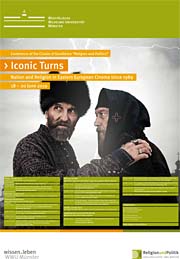"Iconic Turns"
Nation and Religion in Eastern European Cinema since 1989

Poster of the Conference "Iconic Turns"
The conference Iconic Turns will explore the multiple connections of religious and national identities in Eastern European countries after the ›turn‹ of 1989. The cinema, at the center of the continuous production of ›imagined communities‹, will serve as our focus, both as a powerful image-machine and a site of collective practices. Films provide images, myths and narratives that pertain to the construction of collective identities. For example, a film might discuss how to relate to Europe as a space, suggest suitable historical narratives, or propose national heroes and heroines.
In the context of Eastern Europe post 1989, cinematic attempts to imagine the nation are often linked to religious traditions. Not only do the concepts of ›nation‹ and ›religion‹ gain new importance in the post-communist era, but they also create productive and sometimes conflictual interactions. These interactions deserve a closer look from both a historical and a (film-)analytical perspective.
We are equally interested in the common features of these interactions, as well as in the differences between Eastern European countries ways of relating nation and religion. From this perspective, the political turn of 1989 can be understood as an ›iconic turn‹ as well that relates nation to religion in new filmic configurations, pictures and narrations, thereby preparing these configurations for means of collective identifications.
Program
Friday, 18.06.2010J 12 (Cluster of Excellence "Religion and Politics", Johannisstraße 1-4) |
||
|---|---|---|
| 18:15-18.30 | Welcome and Introduction to the Conference |
|
| 18.30-19.45 |
Hans-Joachim Schlegel, Berlin |
Lecture: Film und Religion im
Osten Europas: Historische und theoretische Aspekte eines
interdisziplinären Themas |
Saturday, 19.06.2010Power(s) and IdentitiesSenatssaal der WWU
(Schloss, Schlossplatz 2) |
||
| 09.00-09.45 |
Izabela Kalinowska-Blackwood, New York |
Religious Diversity and Catholic Identity:
Remembering Polish Jews in Jolanta Dylewska’s Polin |
| 09.45-10.30 |
Eva Binder, Innsbruck |
The Power, the People, and the Role of Religion
in the Films of Pavel Lungin, Russia |
| 11.00-11.45 |
Liliya Berezhnaya, Münster |
Empire and Nation in Russian Religious Films |
| 11.45-12.30 |
Gergana Doncheva, Sofia |
National Identities in Balkan
Cinema since 1989: Is Religion an Influential Component in Their Screen
Projections? |
Saturday, 19.06.2010Memory and WarSenatssaal der WWU
(Schloss, Schlossplatz 2)
|
||
| 15.00-15.45 | John-Paul Himka, Edmonton |
A Cinematic Churchman: Metropolitan Andrei
Sheptytsky in Oles Yanchuk’s Vladyka Andrei, Ukraine |
| 15.45-16.30 |
Nicole Kandioler, Wien |
Representing the Unrepresentable. Katyń
(Poland, 2007) by Andrzej Wajda |
| 17.00-17.45 |
Marijana Erstić, Siegen |
No Man's Land oder: Religion und Nation im
Kriegsfilm aus Bosnien |
| 17.45-18.30 |
Harutyun Harutyunyan, Münster |
Do Not Be Afraid! – A Must See Movie about War
& Love? The (Re-)Birth of “Sacred Nationalism” and “Patriotic
Religiosity” in Armenian Films |
|
Sunday, 20.06.2010 |
||
| 09.00-09.45 | Christian Schmitt, Münster |
Freak Nation. György Pálfi's Taxidermia and
Community's Grotesque/Sacred Body |
| 09.45-10.30 |
Jan Culik, Glasgow |
The Godless Czechs: The Construction of a
National Mythology in Post-Communist Czech Cinema |
| 11.00-11.45 |
Doru Pop, Cluj |
The Imaginary of the New Romanian
Cinematographers and the Christian Orthodox Iconography |
| 11.45-12.30 |
Alfrun Kliems und Mathias Mesenhöller, Leipzig | The Gods and the Void. Nation and Religion in
East European Steppe Movies |
| 12.30-13.00 |
Concluding Discussion |
|

